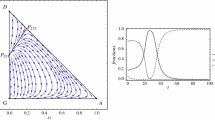Abstract
We study the relations between strategies in game theory and the conformity. The latter is a behavior deemed relevant in social psychology and, as shown in several works, it strongly influences many social dynamics. We consider a population of agents that evolves in accordance with a payoff matrix which embodies two main strategies: cooperation and defection. In particular, agents play a game (e.g., the Prisoner’s Dilemma) by choosing between these two strategies, in order to increase their payoff, i.e., their gain. During the evolution of the system, agents can change strategy according to an update rule, i.e., they can play sometimes as cooperators and sometimes as defectors. Usually, rules to update the strategy are driven by the payoffs of the neighbors of each agent. For instance, an agent imitates its best neighbor, i.e., the one having the highest payoff among the other neighbors. In this context, ‘imitation’ means to adopt the strategy of another agent. In order to study if and how the emergence of cooperation can be affected by a social influence, we provide agents with two different behaviors, i.e., conformity and nonconformity, they use to select their strategy. Numerical simulations show that conformity strongly affects these dynamics, as cooperation emerges in the population, even under conditions of the games that usually lead, almost all agents, to play as defectors.
Access this chapter
Tax calculation will be finalised at checkout
Purchases are for personal use only
Similar content being viewed by others
References
Aronson, E., Wilson, T.D., Akert, R.M.: Social Psychology. Pearson Ed, Saddle River (2006)
Galam, S.: Sociophysics: a review of Galam models. International Journal of Modern Physics C 19–3, 409–440 (2008)
Castellano, C., Fortunato, S., Loreto, V.: Statistical physics of social dynamics. Rev. Mod. Phys. 81–2, 591–646 (2009)
Gracia-Lazaro, C., Cuesta, J.A., Sanchez, A., Moreno, Y.: Human behavior in Prisoner’s Dilemma experiments suppresses network reciprocity. Sci. Rep. 2, 325 (2012)
Colman, A.M.: Game Theory and Its Applications Digital Printing (2008)
Galam, S., Walliser, B.: Ising model versus normal form game. Phys. A 389, 481–489 (2010)
Pena, J., Volken, H., Pestelacci, E., Tomassini, M.: Conformity hinders the evolution of cooperation on scale-free networks. Phys. Rev. E 80–1, 016110 (2009)
Pena, J., Volken, H., Pestelacci, E., Tomassini, M.: Conformity enhances network 20141299 in evolutionary social dilemmas. J. R. Soc. Interface 12, 016110 (2015)
Antonioni, A., Tomassini, M., Buesser, P.: Random diffusion and cooperation in continuous two-dimensional space. J. Theor. Biol. 344, 40–48 (2014)
Meloni, S., Buscarino, A., Fortuna, L., Frasca, M., Gomez-Gardenes, J., Latora, V., Moreno, Y.: Effects of mobility in a population of prisoner’s dilemma players. Phys. Rev. E 79–6, 067101 (2009)
Axelrod, R.: The Evolution of Cooperation. Basic Books, Inc., New York (1984)
Sznajd-Weron, K., Sznajd, J.: Opinion evolution in closed community. Int. J. Mod. Phys. C 11–6, 1157 (2000)
Galam, S.: Contrarian deterministic effects on opinion dynamics: “the hung elections scenario”. Phys. A: Stat. Mech. Appl. 333, 453–460 (2004)
Javarone, M.A.: Social influences in opinion dynamics: the role of conformity. Phys. A: Stat. Mech. Appl. 414, 19–30 (2014)
Javarone, M.A.: Network strategies in election campaigns. J. Stat. Mech. Theory Exp. 2014, P08013 (2014)
Gross, T., Hiroki, S.: Adaptive Networks: Theory. Models and Applications. Springer, Heidelberg (2009)
Mobilia, M., Redner, S.: Majority versus minority dynamics: phase transition in an interacting two-state spin system. Phys. Rev. E 68–4, 046106 (2003)
Javarone, M.A., Atzeni, A.E.: Emergence of cooperation in competitive environments. In: IEEE Computer Society - SITIS 2014 - Complex Networks (2014)
Javarone, M.A.: Models and framework for studying social behaviors. PhD Thesis (2013)
Author information
Authors and Affiliations
Corresponding author
Editor information
Editors and Affiliations
Rights and permissions
Copyright information
© 2015 Springer International Publishing Switzerland
About this paper
Cite this paper
Javarone, M.A., Atzeni, A.E., Galam, S. (2015). Emergence of Cooperation in the Prisoner’s Dilemma Driven by Conformity. In: Mora, A., Squillero, G. (eds) Applications of Evolutionary Computation. EvoApplications 2015. Lecture Notes in Computer Science(), vol 9028. Springer, Cham. https://doi.org/10.1007/978-3-319-16549-3_13
Download citation
DOI: https://doi.org/10.1007/978-3-319-16549-3_13
Published:
Publisher Name: Springer, Cham
Print ISBN: 978-3-319-16548-6
Online ISBN: 978-3-319-16549-3
eBook Packages: Computer ScienceComputer Science (R0)




